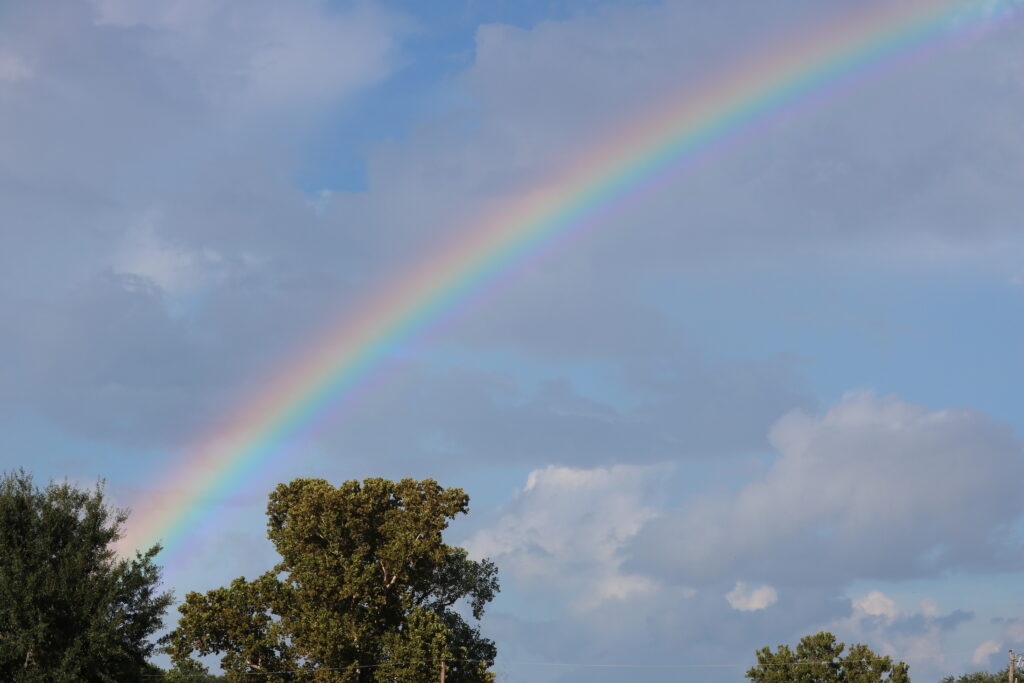The other day some friends asked how my house was doing after the damage from Hurricane Ida. I said “well it has been patched up by some great friends, thank God, and I am happy to say I can sleep in my own bed. So I am thrilled about that and I feel so blessed by all of the help I’ve been given, and I know I’m better off than so many others.” I thought to myself “but when I walk into my condo, I see a huge 8×4 sheet of sheet rock in front of me and a 4ft high stack of leftover insulation and unfinished work and sheet rock torn out of my walls and no railing to hang on to when I take my stairs and I keep tripping over my ceiling fan on my dining room floor and I really miss my ceiling fan and my screen door and I’m not sure when repairs will get done going forward because I still have temporary repairs on my roof and how long will they last and when will things be normal…”.

Counting our blessings is good. But this does not mean that we always have to feel blessed. Of course things could always be worse. That is not the point. We can still be feeling a lot of other emotions like grief, loss, sadness, anger, frustration, abandonment, fear, confusion, disorganized – we can feel all of these things while we may be feeling gratitude and relief.
I remember about six months after Hurricane Katrina flying out of New Orleans to visit friends in another state. Taking off, I saw a field of blue tarp, still covering so many homes. That had become normal to me. I did not realize how much my normal had changed in the months after Katrina until I left town. Everything there was so darned normal. All of the buildings had windows. There was no tarp. No smell (that I cannot describe to this day). No lines. No shortages. This made me realize how much our normal can change in the blink of an eye.
We take names at the door for contract tracing at my church due to covid. The Sunday we returned after Ida, someone walked in and I asked them to sign in as usual. Their first thought was that it was Ida-related. I said no, we are back to the realization that our older problems are still here too – the pandemic. We had a laugh about it, and maybe found comfort that at least the pandemic was a problem we were familiar with, so something at least was back to normal – whatever normal has become.
According to some recent training I have had, climate disasters (and other unexpected events) can often have an effect on our mental and physical health. These effects can be long or short term. We may have good days, but we may also have some bad days. And certain things that happen can trigger our anxiety or stir up memories from past traumas. Consider the sequence of events for most storms. If you read through this, it will be easy to understand how our minds and bodies can respond in positive (protective) ways and negative ways.
When a storm begins heading towards the Gulf, the stress begins. Will it come? Will it be another Katrina? Memories of Katrina came flooding back for many people. Will it flood…will our homes be damaged…could we die…should we evacuate when everyone else is on the road and a 1 hour trip to Baton Rouge will take 6 hours…how will our pets cope. Will our employers excuse us from work…will we be paid…will we have a job when we return.
When we are pretty sure the storm is coming, we begin to prepare. We bring all of our outdoor furniture and decorations inside or tie them down. My condo was cluttered with patio decorations sitting on a shower curtain and huge potted plants in my small kitchen. We stock up on supplies: batteries, nonperishable food, flashlights, generators for the lucky few who know how to work those things. Then we hunker down and pray that that nothing bad will happen.
Then the storm comes. During the storm people may feel the constant banging of things against their homes, the sound of the wind, looking outside and seeing pieces of buildings and other things flying by, trees bent down to the ground, some seeing water rising in the streets. My building was literally shaking, my furniture was wobbling, my screen door flew off and I hoped that my front door would not follow suit. I sat for a couple of hours near the front door, sometimes leaning against it thinking that would stop it from blowing in (later I was told that my attempts would have been hopeless against a 150 mile gust).
Then there is the aftermath – in my case 4 days of intense heat with no power, no air conditioning. Watching food go bad in the freezer, throwing it all out, mitigating what damage I could with the hole in my roof and my ceiling caving in, removing the wet sheet rock from my new bed, moving my mattress out of the way, praying it wouldn’t rain again until tarp could be placed on the roof, tensing up every time I heard thunder, finally deciding to leave after 4 days, chasing the cats around the condo in 100 degree heat to stuff them into carriers, driving to a hotel with them crying the whole four hours in the car, sitting in a hotel for a week wondering if it rained inside of my condo, finally knowing I had power 10 days later and driving home not knowing what I would find.

Am I blessed? You bet I am. I had church friends who helped me patch my church roof almost right away so I didn’t have to air condition my attic for too long. The roof was tarped and there was no further damage. I had to sleep in my office for over a week, but it wasn’t bad. During the whole process, I was texting with friends, we were all checking on each other. I met new friends in my condos as we walked around like zombies checking out the damage, sitting by the pool to try to cool off and sharing stories. I was so blessed by my church. These are all blessings that are particularly special when they happen during a time of forced endurance in situations that are so beyond our control and can be downright frightening.
So, yes, I do count my blessings. But I also realized that when we walk around and say we are feeling blessed because others are worse off and things could be worse and we see the good in every situation, we are sometimes not honoring the feelings of grief and stress and fear and all of those other emotions that happen during times like this. When the storm stops, these feelings often do not go away.
I remember providing a tour of our damaged city to some donors after Katrina. We were sitting in Morning Call and started talking to some fellow New Orleans people at the next table. They shared that they lost everything due to the floods of Katrina. The people in my tour, who were from up north, were so impressed that these people faced so much loss but they were sitting in Morning Call laughing and making jokes. I said, “well what else can we do?” And sometimes laughter IS good medicine.
But again, sometimes we have to recognize our grief too.
We can say that we are blessed, and we are in a lot of ways. But we are also suffering at times. At the grocery store today I saw someone walking back to their car so very angry, muttering curses about being in Walmart. I don’t know what set her off, but I am betting that she is under a lot of stress. Somehow, feelings about events that happen to us will manifest themselves. People may become angry at “little” things, they may go around picking fights, people will be distracted, and people will make mistakes. People with mental issues and addiction issues are more likely to relapse during these times.
But there is hope. We do emerge on the other side. We do have good days. In the meantime, here are some thoughts we can use to cope when things get difficult:
- We are blessed, but we are also stressed, and that is ok. Yes, others may be worse off, but this is not a contest. We feel what we feel.
- We cannot control everything. Fix what you can, let go of the rest.
- See the humor. I have many funny memories about things that happened during stressful times. Sometimes things are funny. But it’s ok to be sad too.
- Notice the goodness that emerges during these situations. It is a beautiful thing to see people from all over the country spring into the action to help. Yes, bad things are happening, but we see good too when we look for it. We talk to strangers more, in grocery store lines, to neighbors, to ask about each other’s experiences.
- Do not minimize your pain. Yes, others have it worse. But that does not minimize your pain or the pain of others.
- Help others when you can. If you want to go out and gut houses, do that, but if your gift is listening to someone with empathy or calling to check on someone, that is great too. Do what you can. Nothing more, nothing less.
- Try to respond with kindness and understanding. Recognize that when you see others acting out, they are probably stressed with all of this mess.
- Give yourself a break. You have been through a lot.
- Love. Just love people where they are. Love yourself where you are. It is easy to hear when people are telling you how blessed they are. But dig deeper. Maybe they are saying this to make you feel good. Maybe they are really needing a good ear and some sympathy.
- Take care of yourself. Stop and appreciate the little things. Give yourself permission to rest. Do something relaxing. Meditate. Watch a comedy. Do some crafts. Color.
- Take things one day at a time. Do not think of what the condition of your house/job/situation will be in the future. Do not think about future storms in the Gulf. Just know what you can do today.
- Celebrate small accomplishments. Even if I do not feel the energy to do everything on my list, I remind myself that whatever I did do, no matter how small, was an accomplishment, and I celebrate that. And if I didn’t do anything, then I rested, and resting is productive because it is rejuvenating.
- Remind yourself of your resilience. You have gotten through difficult things before. You’ve got this!
- If things become overwhelming, seek help. Counseling can help. Why carry the burden alone if you can share it with someone?
Whoever you are, you have been through a lot, and you are getting through it! There are blessings in life, there are losses in life, there is recovery in life, and there is resilience in life. We will experience all of these things at one time or another. You have permission to feel all of the emotions you need to feel, and to share how you feel with people who want to listen.